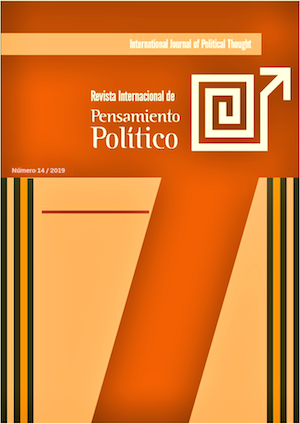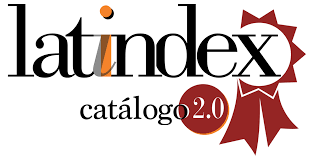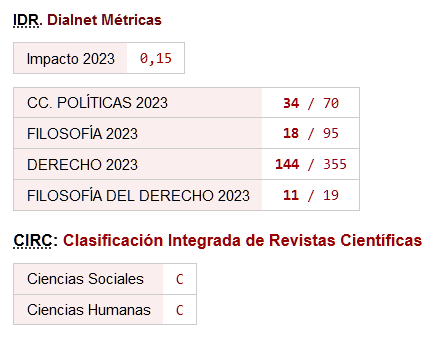Polititics, democracy and technics in public management: the case of new public management
DOI:
https://doi.org/10.46661/revintpensampolit.4829Keywords:
public management, democracy, politics, political philosophy and theory, technical rationalityAbstract
The activity of public management is usually thought of as antithetical both to politics and political theory/philosophy. The so-called New
Public Management theory illustrates how public management theories can rest on a discourse of technical and economic rationality in order to hide its political content and to distance it from public discussion. By arguing that technique needs politics, we will reveal the political ideology underlying its management premises. Finally, we defend that public management theories should always be assessed from the normative
Downloads
References
Arellano, D. y Cabrero, E. (2005), «La Nueva Gestión Pública y su teoría de la organización: ¿son argumentos antiliberales? Justicia y equidad en el debate organizacional público», Gestión y Política Pública, 14 (3), pp. 599-618.
Barber, B. (1998), «Un marco conceptual: política de participación», en R. del Águila, (ed.), La Democracia en sus textos, Madrid, Alianza Editorial, pp. 281290.
Barzelay, M. (2001), The New public management: improving research and policy dialogue, New York, Russell Sage Foundation.
Bekkers, V. et al. (2007), Governance and the democratic deficit: assessing the democratic legitimacy of governance practices, Burlington, Ashgate.
Bellone, C. J., Goerl, G. F. (1992), “Reconciling public entrepreneurship and democracy”, Public Administration Review, 52 (2), pp. 130-134.
Berlin, I. (2013), The power of ideas, Princeton, Princeton University Press.
Box, R. C., et al. (2001), “New public management and substantive democracy”, Public Administration Review, 61 (5), pp. 608-619.
Caiden, G. (2006), “The administrative state in a globalizing world: some trends and challenges”, Comparative Public Administration, 15, pp. 515–542.
Campbell, J.L. (2002), “Ideas, Politics, and Public Policy”, Annual Review of Sociology, 28, pp. 21-38.
Christensen, T. y Lægreid, P. (2002), “New Public Management: Puzzles of Democracy and Influence of Citizens”, Journal of Political Philosophy, 10, pp. 267–95.
Crozier, M. (1996), «La necesidad urgente de una nueva lógica», en Q. Brugué y J. Subirats (eds.), Lecturas de Gestión Pública, Madrid, Ministerio de Administraciones Públicas, pp. 25-38.
DeLeon, L. (2005), “Public Management Democracy and Politics”, en E.N. Ferlie (ed.), The Oxford Handbook of Public Management, New York, Oxford University Press, pp. 103-132.
Denhardt, R. B. (2004), Theories of Public Organization, Australia, Wadsworth.
Efficiency Unit (1998), Improving Management in Government: The Next Steps, London, HMSO.
Ellul, J. (2003), La edad de la técnica, Barcelona, Octaedro.
Finlayson, A. (2004), “Political science, political ideas and rhetoric”, Economy and Society, 33, (4), pp. 528-549.
Frederickson, H. G. (1997), The Spirit of public administration, San Francisco, Jossey-Bass.
Freeden, M. (2013), Ideología: Una brevísima introducción, Santander, Ediciones Universidad de Cantabria.
Gay, P. du (2012), En elogio de la burocracia: Weber, organización, ética, Madrid, Tres Cantos, Siglo XXI.
Goodin, R. E. y Dryzek, J. S. (2006), “Deliberative impacts: the macro-political uptake of mini-publics”. Politics & society, 34(2), 219-244.
Goodin, R. E. (2008), Innovating democracy: Democratic theory and practice after the deliberative turn, Oxford, Oxford University Press.
Guerrero Orozco, O. (2003), «Nueva gerencia pública: ¿gobierno sin política?», Revista Venezolana de Gerencia, 23(8), pp. 379-395.
Habermas, J. (1994), “Three normative models of democracy”, Constellations, 1 (1), pp. 1-10.
Hayek, F. A. (1982) «Los principios de un orden social liberal», Estudios Públicos, 6, pp. 179-202.
Hood, Ch., (1991), “A public management for all seasons?”, Public administration, 69 (1), pp. 3-19.
Hood, Ch., (2000), The art of the State culture rethoric and public management, Oxford, Clarendon Press.
Laclau, E. y Mouffe, C. (1987), Hegemonía y estrategia socialista. Hacia una radicalización de la democracia, Madrid, Siglo XXI.
Lynn, L. E. (2006), Public management: old and new, New York, Routledge.
Metcalfe L.; Richards S. (1989), La Modernización de la gestión pública, Madrid, Instituto Nacional de Administración Pública.
Metcalfe, L. (1996), «Gestión pública: de la imitación a la innovación», en Subirats, J. Brugué, J. (coord), Lecturas de gestión pública, Madrid, Ministerio de Administraciones Públicas, pp.77-100.
Mises, L. von (2011), La acción humana: Tratado de economía, Madrid, Unión Editorial.
Mouffe, Ch. (1999), El retorno de lo político, Barcelona, Paidós.
Nardin, T. (2015), “Rationality in politics and its limits”, Global Discourse, 5(2) pp. 177-190.
National Performance Review (1993), From Red Tape to Results: Creating a Government that Works Better and Costs Less, Washington DC., US Government Printing Office.
National Performance Review, (1995), Common Sense Government: Works Better and Costs Less, Washington DC., US Government Printing Office.
Osborne, D. y Gaebler, T. (1995), La Reinvención del gobierno: la influencia del espíritu empresarial en el sector público, Barcelona, Paidós.
Parliament of the Commonwealth of Australia (1990), Not Dollars Alone. Review of the Financial Management Improvement Program, Ottawa, Australian Government Publishing Service.
Peters, B. G. (2002), “The changing nature of public administration: from easy answers to hard questions”, Asian Journal of Public Administration, 24 (2), pp. 153-183.
Rocard, M. (1989), “Circulaire du 23 février 1989 relative au renouveau du service public”, Journal Officiel de la République Française, pp. 2526-2529.
Rodríguez Fontenla, Elena R. (2017) “El discurso ideológico de la racionalidad técnica en los modelos de gestión y organización pública: la Nueva Gestión Pública y el reto a la administración pública democrática”, Madrid, VIII Congreso Internacional en Gobierno, Administración y Políticas Públicas GIGAPP, pp. 1-21. (Disponible en: https://dryfta-assets.s3-accelerate.amazonaws.com/assets/congreso/abstractfiles/abs_329_1504381906PonenciaGigapPonenciaGigappElenaRodr.pdf)
Román Masedo, L. (2012), «Consecuencias políticas de la acción administrativa: el paradigma del ciudadano-cliente», RIPS. Revista de Investigaciones Políticas y Sociológicas, 11 (1), pp. 81-103.
Rossi, E. y Sleat, M. (2014), “Realism in Normative Political Theory”, Philosophy Compass, 9-10, pp. 741-744.
Rutgers, M. R. y Meer, H van der (2010), “The origins and restriction of efficiency in public administration: Regaining efficiency as the core value of public administration”, Administration & Society, 42(7), pp. 755-77.
Schachter, H. L. (2007), “Does Frederick Taylor’s ghost still haunt the halls of government? A look at the concept of governmental efficiency in our time”, Public administration review, 67 (5), pp. 800-810.
Self, P. (1993), Government by the market? The politics of Public Choice, Hampshire, Macmillan.
Spicer, M. W. (2010), In defense of politics in public administration: a value pluralist perspective, Tuscaloosa, University of Alabama Press.
Subirats, J. (2000), «Democracia, participación y eficiencia», Foro internacional, 40 (3), pp. 430-450.
Svara, J. H. (1999), “Complementarity of politics and administration as a legitimate alternative to the dichotomy model”, Administration & society, 30(6), pp. 676-705.
Van Dijk, T. A. (2003), Ideología y Discurso: una introducción multidisciplinaria, Barcelona, Ariel.
Waldo, D. (1960), Teoría política de la administración pública: el Estado administrativo, Madrid, Tecnos.
Waldo, D. (1999), «Una teoría de la administración pública significa en nuestra época también una teoría de la política», en N. Lynn y A. Wildavsky (comp), Administración pública: el estado actual de la disciplina, México, Colegio Nacional de Ciencias Políticas y Administración Pública, pp. 126-137.
Downloads
Published
How to Cite
Issue
Section
License
Copyright (c) 2020 Creative Commons 4.0 Internacional

This work is licensed under a Creative Commons Attribution-NonCommercial-ShareAlike 4.0 International License.
Open access policy
Free and open access is allowed to any interested party to all the contents of the journal issues, free of charge, being able to print and transfer all the articles, with the only condition of specifying the source and authorship.
The journal: a) does not charge authorship costs for the processing of articles or for their submission, b) maintains copyright for authors without restrictions, c) facilitates authors to keep their publication rights without limitations.
The International Journal of Political Thought is an original work of the Laboratory of Political Ideas and Practices of the Pablo de Olavide University. All articles included in the Journal are original work of their respective authors. This Journal is freely offered to the scientific and academic community at no cost and releases the contents according to the license "Attribution-NonCommercial-ShareAlike 4.0 CC BY-NC-SA" of the Creative Commons project available in the following url: https://creativecommons.org/licenses/by-nc-sa/4.0/legalcode
If you wish to translate or compile any of the articles available here, please contact us at contacto












 ISSN: 1885-589X
ISSN: 1885-589X  Universidad Pablo de Olavide
Universidad Pablo de Olavide